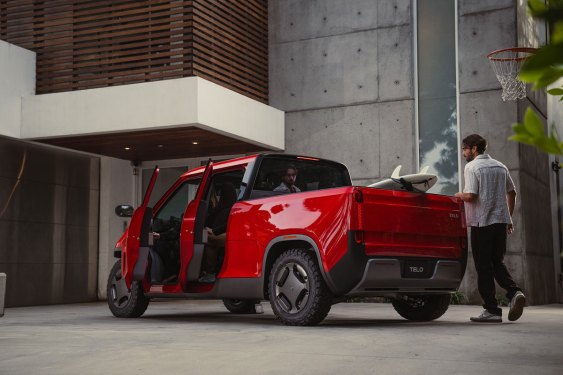Big electric trucks are having a hard time. The Cybertruck is a bust, Stellantis just canceled the Ram 1500 EV, and even sales of Ford’s promising F-150 Lightning have been on the decline. But the United States loves trucks. So is the key to making them love electric trucks a very small one?
That is the bet that California-based startup Telo has been making since its inception in 2022. The company has designed a bite-sized truck called the MT1 with an admittedly not-so-small starting price of around $41,000.
Now, investors want in on that same bet. Telo announced Tuesday it has closed a $20 million Series A funding round. The round was co-led by designer Yves Béhar and Tesla co-founder Marc Tarpenning, who are also Telo co-founders. Additional investment came from Salesforce CEO Marc Benioff, and early stage funds like TO VC, E12 Ventures, and Neo.
In the world of automotive manufacturing, $20 million does not go very far. For contrast, Slate Auto, which is building its own wild take on a small electric pickup truck, has raised more than $700 million to date. Startups like Fisker Inc., Canoo, and Lordstown Motors also raised hundreds of millions before they all collapsed.
Telo has far more modest goals and a sharper aim than those companies. The company’s hyper-focus is on trucks for the downtowns of cities, according to co-founder and CEO Jason Marks. While Telo may someday embrace other markets, like small farmers who have shown interest, the company considers those secondary. Marks wants to conquer cities first, stating he has spent far too much time circling San Francisco streets looking for parking to focus on any other use case.
Telo is not promising to build hundreds of thousands of MT1s. Instead, it has a pre-order list of around 12,000, and Marks said Telo initially plans to build around 5,000 per year via contract manufacturing. The company’s whole ethos is to achieve unit profitability as quickly as possible, which positions it differently from other automakers who claim they need a billion dollars to get to production.
The Series A funding will go toward building the final production-intent version of the MT1, homologating the vehicle to U.S. safety standards, and finishing crash testing. Marks said that last piece is key because the MT1’s short front end has understandably inspired many questions about safety. Telo hopes to deliver its first MT1 by the end of 2026.
To get the most out of the funding, Marks said Telo will stay as lean as physically possible. That means keeping its workforce to around 25 employees in the near-term while leveraging consultants and contractors, many of whom have long-standing relationships with co-founder Marc Tarpenning. The idea of using outside help is getting a boost with the Series A, as Telo filled the round with angel investors and smaller companies from across the EV world, a community that wants to see new architectures for mobility succeed.
The MT1 is a big idea, but it is not all about size. Marks said Telo has spent a lot of time ensuring the MT1 is useful, oriented around the idea of performance per square foot. He claims it is the only vehicle that can seat five people with a five-foot bed. Despite its diminutive stature, this gives it roughly an extra half-foot of space compared to competitors like the Rivian R1T or the Ford Maverick.
The biggest part of the MT1’s usefulness might be its range. Marks is adamant the truck will get around 350 miles on a full battery, putting it up there with some of the most capable EVs on the market. This makes the truck capable of longer drives and means less charging for the city-dwellers Telo is targeting.
Telo achieved this figure through a combination of factors. The MT1’s small stature makes it inherently less heavy than a normal-sized truck, boosting efficiency. However, packaging the large 106kWh battery pack in such a small footprint was challenging. Marks did not go into detail as patents are pending, but he said the MT1 essentially gives up some performance, like faster acceleration, in exchange for making the battery pack work in the footprint of a Mini Cooper.
That robust range may be tempting if it ultimately bears out. The rise in popularity of imported Japanese Kei trucks in the U.S. shows that people are willing to go to great lengths for something in this form factor.
There are real headwinds against EVs in the U.S. these days, but Marks believes Telo can break them. He contrasts the Silicon Valley mantra of moving fast and breaking things with another Silicon Valley nature: how to do a ton with the smallest amount of capital and the smallest team possible, doing things that big corporations cannot do.

